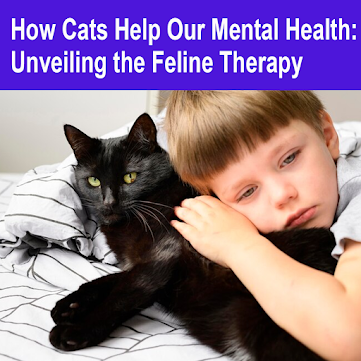How Cats Help Our Mental Health: Unveiling the Feline Therapy
Many people have found a silent comrade in their feline pets amongst the chaos of daily life, when stress and worry frequently take center stage. Cats are not just adorable and cuddly; they also have a unique potential to improve our mental health. Let's examine the many healing benefits of living with cats.
Cats as Companions: Easing Loneliness
Cats give companionship that helps lessen the extreme sensation of loneliness many people suffer, in addition to fluffy cuddling. This is demonstrated by the pitter-patter of little feet and the soft purring by your side. A feline friend's unconditional affection and acceptance for you establish a special link that lessens the loneliness.
Reducing Stress Levels: The Calming Presence of Cats
Research continuously demonstrates the stress-relieving benefits of socializing with cats. The hormone linked to stress, cortisol, can be lowered simply by caressing a cat. Cat owners may use this natural stress-relieving method to make a difficult day more peaceful.
Cats and Anxiety: Furry Friends as Stress Busters
Cats are adept at reducing anxiety in addition to reducing stress. A tranquil mood is produced by their reassuring presence and kind disposition. The comforting warmth of a cat curled up on your lap or its rhythmic purring is two examples of how these furry therapists greatly aid in the management of anxiety.
The Healing Power of Purring: A Natural Stress Reliever
There is evidence that the low-frequency vibrations that a cat purrs create have therapeutic benefits. Natural stress relief is provided by the music, which also encourages relaxation and may even speed up physical healing. It seems like cats have a soundtrack for relaxation built right into them.
Routine and Responsibility: Structuring Daily Life with Cats
A cat's daily care therapy, which includes feeding, brushing, and playing with them, gives them structure and a purpose. Having a cat may provide stability and regularity to those who are dealing with mental health challenges, which can improve their general well-being.
Physical Activity and Play: Boosting Mood Through Interaction
Cats' playful behaviors are known to elevate one's mood in addition to being amusing. Playing interactively with its owner generates endorphins in addition to giving the cat physical activity. It's a win-win scenario that infuses happiness and vitality into everyday existence.
Cats as Non-Judgmental Confidants: A Safe Space
Cats are excellent at fostering a nonjudgmental atmosphere. They listen without passing judgment or making suggestions, creating a secure environment for sharing feelings. Speaking to a cat about your thoughts and feelings may be unexpectedly therapeutic and provide a special kind of emotional release.
Cats and Social Connection: Facilitating Human Interaction
Having a cat can encourage more social engagement. Cats become social catalysts, creating bonds with neighbors over shared feline experiences or setting up discussions with other cat fans at the vet, all of which have a favorable impact on mental health.
Therapy Cats: Professional Support in Unconventional Forms
Therapy cats are more than just animals used as assistance animals. These professionally trained feline friends give consolation and support to people dealing with a range of mental health issues in therapeutic settings. A therapy cat's soft presence may have a profound impact on someone's emotional health.
Understanding the Bond: Science Behind Cat-Assisted Therapy
Research on the physiological and psychological advantages of cat ownership has been conducted. It has been demonstrated that the human-animal link that develops with cats may lower heart rates, and blood pressure, and even produce the "love hormone," oxytocin. Physiological reactions like this support a feeling of general well-being.
Challenges and Considerations: Responsible Cat Ownership
Even though owning a cat has many positive effects on mental health, some drawbacks should be considered. Understanding the commitment needed, potential allergies, and making sure the cat and owner live in an appropriate environment are all part of responsible cat ownership.
Thank you for reading How Cats Help Our Mental Health: Unveiling the Feline Therapy
More for you Tips on finding a lost cat, Understanding Your Cat's Body Language, Tips for Choosing the Right Cat Breed, The benefits of having a cat as a pet, Common Cat Health Issues and Preventive Care, What is Catnip and why do cats love it, Best environment for cat, Cat Balanced Diet, Cat Balanced Diet, Essential Cat Training Tricks, What Tunes Do Cats Prefer, Cat Tail Body Language, The Surprising Health Benefits of Cat Ownership, Cats and the Six Senses Unveiling the Sensory Wonders












No comments:
Post a Comment